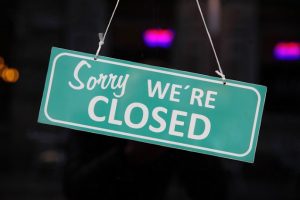 In a few days, my alma mater Whittier Law School will shut its doors for good. Every student has been accounted for. The faculty and staff have either retired or hopefully gotten jobs elsewhere. All of the school’s records will be sent to Whittier College in case alumni need transcripts. The last few days will be spent packing and cleaning.
In a few days, my alma mater Whittier Law School will shut its doors for good. Every student has been accounted for. The faculty and staff have either retired or hopefully gotten jobs elsewhere. All of the school’s records will be sent to Whittier College in case alumni need transcripts. The last few days will be spent packing and cleaning.
Whittier Law School (previously known as Beverly Law School) catered to people who were choosing law as a second career or wanted to work in public service. But the school also took in traditional law students with almost all of them intending to transfer to another law school after their first year. But only a few in the top of the class succeeded. The low bar passage rate and the school’s 4th tier status on the US News rankings did not make graduates attractive to traditional firms.
In recent years, the law school was suffering a crisis. Government and public service work became even more difficult to obtain. This was mostly due to the federal government’s Public Service Loan Forgiveness program which forgives federal student loans tax free after working for the government or a 501(c)(3) organization for 10 years. With students from most law schools leaving with $250,000 or more in federal student loan debt, being debt free after 10 years while working in a more job-secure and relaxed work environment is becoming a very powerful incentive.

Humans in the Loop: The People Powering Trusted Legal AI
As the use of artificial intelligence permeates legal practice, a critical question confronts every legal professional who uses these tools: Can I trust this?
Also, it became common knowledge that most graduates of schools like Whittier would have difficulty finding jobs which led some potential students to reconsider their decision to attend.
The leaders of Whittier College considered many options but none of them appeared to be feasible. The school was projected to have financial deficits in future years due to increasing costs and falling enrollment. So in April 2017, the decision was made to stop accepting students and eventually close the law school.
I recently visited the school possibly for the last time. I made an appointment to meet with the last dean of the school Rudy Hasl.
As I approached the campus, to my surprise, the parking lot was packed with cars. But there was not going to be a surprise revival or a mystery white knight buyer. Nor was there a final alumni celebratory event going on. Instead, a local auto dealer rented the campus parking lot to store their excess inventory.

Transform Legal Reasoning Into Business-Ready Results With General AI
Protégé™ General AI is fundamentally changing how legal professionals use AI in their everyday practice.
When I went to the administration building where the dean’s office was, it was empty and locked. I next tried the faculty building where the professors’ offices were. That building was also permanently empty.
That left only one building. The building where we went to class, watched the Lakers or Angels games in the lounge, or just hung out in one of the rooms dedicated to student organizations.
As I walked to the classroom building, I passed by the large grass yard. I recall the occasional parties we had there. The yard was immaculate. The grass was lush green and recently mowed. This made me believe that someone was going to continue using the real estate after the closure.
Walking inside the halls of the classroom building, I saw a photo of the old campus. It was first located in a suburb of Los Angeles where I lived many years ago. My sister went to the elementary school next door while I went to the junior high school a few blocks away. Back then, I thought the building had a mystical look and might have been occupied by a cult that trained wizards and witches.
The dean was waiting for me in one of the rooms which used to be the headquarters for the Whittier Journal of Child And Family Advocacy. Since the journal has been disbanded, the space is now being used as the administrative office.
Dean Hasl and I talked about many things at length. Since he is retiring after the closure, I figured that he would not mince words. We talked about the reasons why law schools are expensive, the obsession with prestige in the profession, the quality and necessity of legal scholarship, and how future lawyers should be trained to meet the needs of the underserved. We agreed on some things, disagreed with others.
As I was driving away from the campus, I noticed a Hooters a block away. How convenient that it opened only a few months after I graduated. A few blocks further was an In-N-Out burger joint. For those not living in the West Coast, it is famous for its Double-Double burgers and stays open late. It would have been great comfort food during the late night study sessions.
Since graduating over 10 years ago, I have visited most of the law schools in Southern California and a few in other parts of the country. Visiting them made me appreciate Whittier Law School in ways I didn’t notice in the past. Whittier Law School was a relatively large, quiet, modern looking campus. The buildings had only one floor which means not having to wait for an elevator or walking up several flights of stairs to get to class or to a professor’s office. Some of the other law schools I visited were located in filthy, sketchy and crowded parts of the city. I had difficulty finding parking in others. And visiting a few felt like stepping into a time capsule from the middle of the twentieth century.
I have heard many lawyers say that some law schools should be shut down. But I’m sure they don’t want their alma mater to be on the list. And of course, I didn’t want my law school to close either. On the other hand, things could have ended a lot worse. Some law schools were forcibly shut down in the middle of the semester leaving their students with few options. Some were under investigation by the state’s Attorney General for predatory practices.
Was it possible for Whittier Law School to avoid closure? Perhaps, but it would’ve required all stakeholders to make significant concessions. Tuition and enrollment size would have to decrease. Faculty might have to accept salary freezes, salary cuts or even buyouts, some of whom already have. Students who are not likely to pass the bar exam or obtain jobs should be removed as soon as possible before they accrue more debt. Whittier College could have invested more money to modernize the campus. But I think deep down everyone knew the truth: All of this was not likely to change anything given the industry’s obsession with rankings and the difficulty of meaningfully improving the rank.
Goodbye Whittier Law School. As for myself, I was a member of Moot Court, the Trial Advocacy Team and was the Student Body Treasurer. I met some of my best friends there. And now as a director of the Whittier Law Alumni Association, I will try to stay in touch with remaining alums. The law school has not produced many Biglaw partners or federal appellate judges. But the attorney helping immigrants in Orange County is probably a Whittier grad. The attorney charging a reasonable rate to the middle class is also likely to be a Whittier grad. The judge presiding over cases in a rural county is probably a Whittier grad. While I am sad to see the school close, I am glad that it is closing honorably rather than continuing in the expensive and abusive educational arms race or trying to rebrand itself.
Steven Chung is a tax attorney in Los Angeles, California. He helps people with basic tax planning and resolve tax disputes. He is also sympathetic to people with large student loans. He can be reached via email at [email protected]. Or you can connect with him on Twitter (@stevenchung) and connect with him on LinkedIn.